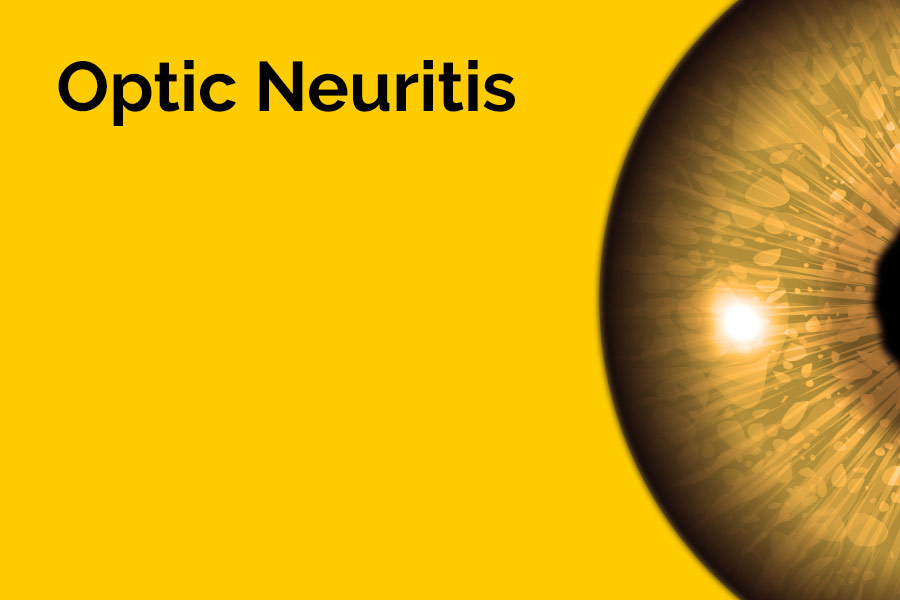Optic Neuritis
The optic nerve carries visual information to the brain. Optic neuritis is an inflammation of the eyes optic nerve. It is believed to occur when the body’s immune system mistakenly attacks optic nerve tissue leading to swelling and impaired function of the optic nerve. Optic neuritis generally causes temporary vision loss that typically occurs in one eye. As the inflammation subsides, vision is generally restored.
Symptoms
Optic neuritis can have a varying effect on your eyesight. It can range from blurred vision to a complete loss of vision. If often affects just one eye, although it can affect both, either simultaneously or one after another.
Some people notice a blurring or blind spot in the centre of their vision, colours may also appear darker or washed-out. Some people have light flashes (known as phosphenes) when they move their eyes.
In some cases, optic neuritis can cause pain, particularly when you move your eyes. This pain normally lasts for a few days, and shouldn’t be severe enough to affect your sleep. If it does, it may be the result of a different condition.
The worsening of vision tends to progress over a few days to a week, although for some people it can be much quicker – a few hours or overnight.
Diagnosis, Screening and Tests
A diagnosis will generally be carried out by an ophthalmologist, which is generally based on your medical history and an eye examination. The ophthalmologist is likely to perform the following tests:
- A routine eye exam – Your doctor will check your vision and your ability to perceive colours and measure your peripheral (side) vision
- Ophthalmoscopy – During this examination, your doctor shines a bright light into your eye and examines the structures at the back of your eye. This test studies the optic disk, where the optic nerve enters the retina in your eye. The optic disk becomes swollen in around one-third of people with optic neuritis
- Pupillary light reaction test – Your eye doctor may move a flashlight in front of your eyes to see how the pupils respond when they’re exposed to bright light. Pupils in eyes affected by optic neuritis don’t constrict as much as those in healthy eyes do when stimulated with light.
Other tests that can be used to diagnose optic neuritis include:
Magnetic resonance imaging (MRI) scan – An MRI scan uses a magnetic field and pulses of radio wave energy to take pictures of the body. During an MRI scan to check for optic neuritis, you might receive an injection of a contrast solution to make the optic nerve and other parts of your brain more visible in the images.
AN MRI is important to determine whether there are damaged areas (lesions) in your brain. These lesions can indicate a high risk of developing multiple sclerosis. An MRI is able to rule out other causes of visual loss, such as a tumour.
Treatments
Due to a landmark series of studies known as the Optic Neuritis Treatment Trials, treatment of optic neuritis has changed drastically in recent years.
During these studies, people with optic neuritis were randomised for treatment with intravenous steroids, oral steroids or placebo. Afterwards, they were evaluated for several years.
The results of these studies showed that treatment with steroids had little effect on the final visual outcome of patients with optic neuritis.
The patients that were treated with IV steroids had fewer repeat attacks of optic neuritis than patients treated with oral steroids alone. Those treated with oral steroids alone had a higher risk of repeat attacks of optic neuritis than those treated with placebo.
More importantly, patients treated initially with IV steroids had around half the risk of developing MS in two years as patients treated with oral steroids only or placebo. Of those treated with IV (followed by oral) steroids, 7.5% developed MS in the following 2 years, versus around 16% in the other groups.
As a result of the study, eye doctors now treat patients with a combination of IV and oral steroids or monitor the condition without prescribing medical treatment. Use of oral steroids alone is not recommended.
For patients who do receive medical treatment, this generally comes in the form of three days of IV steroids, followed by about 11 days of oral steroids.
Prevention
Unfortunately, there are no clear preventive measures. Patients need to ensure an adequate intake of Vitamin D. Patients with MS are encouraged to give up smoking and to receive influenza vaccinations in seasons deemed to be appropriate, as influenza infections and smoking are risk factors for MS.
